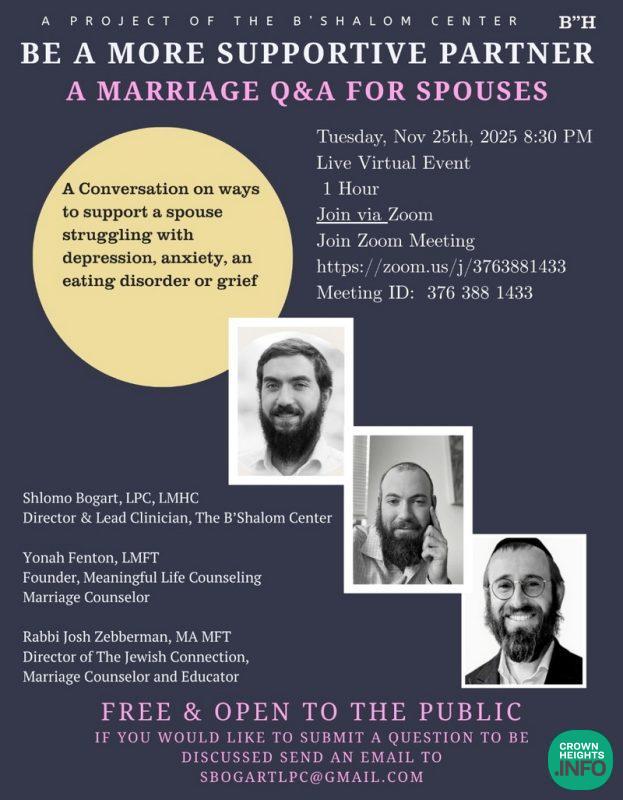
The B’Shalom Center — Growing Together: Q&A Zoom Event
by Rabbi Shlomo Bogart LPC LMHC
Over the past six years, I’ve worked as a therapist with individuals struggling with eating disorders and other mental health challenges. Two years ago, I founded The B’Shalom Center with the goal of bringing a quality, clinically trained treatment team to the Yiddishe community, one that deeply understands and values Yiddishkeit and frum life.
At The B’Shalom Center, we help individuals and families find the treatment plan that best aligns with their values. A big part of my work is helping clients feel truly supported through structure and routine, a strong treatment team, and meaningful connections with others.
Recently, we launched the Be a Healthy Friend initiative, encouraging individuals to connect with others, express feelings, and communicate their needs. It’s also deeply meaningful when a spouse learns how to offer the kind of support that helps their partner feel safe, understood, and able to be their best self.
With that goal in mind, we’re hosting an upcoming Zoom event that I’ll be co-facilitating with two friends and colleagues, Rabbi Josh Zebberman, MA, MFT, and Yona Fenton, LMFT. Both are Lubavitchers who live by Chassidic and Yiddish values, something central to me and to the mission of The B’Shalom Center.
At this event, we’ll address real-life questions about how and when to support a spouse who is struggling and share practical, compassionate guidance for becoming a more understanding and present partner.
In my work as a therapist and case manager, I often meet individuals recovering from eating disorders, anxiety, depression, and OCD who share their experiences with past providers. Many have also attended couples therapy where the approach did not align with their worldview or values, sometimes leaving them feeling more divided than connected.
Unfortunately, when a marriage counselor lacks proper training or doesn’t understand the importance of religious values, it can add confusion and strain to an already vulnerable marriage.
I feel grateful to collaborate with Rabbi Zebberman and Yona Fenton. Their approach truly reflects The B’Shalom Center’s mission to provide clinical guidance that fully honors each person’s Yiddishkeit and values.
Together, we’ll explore what it means to truly support a spouse emotionally, spiritually, and practically. A client recently shared something so simple yet so helpful:
“The first step is to be clear about their diagnosis and then ask your spouse, How can I support you?”
Supporting someone with bulimia looks very different from supporting someone with anorexia. Supporting a spouse struggling with anxiety or panic attacks is not the same as supporting someone navigating postpartum depression or grief.
Clarity allows couples to be more prepared, compassionate, and connected, especially during times of struggle.
In this upcoming Zoom Q&A, we’ll, iyH, address real questions submitted by community members and discuss practical ways to become a more supportive and understanding spouse.
If you’d like to submit a question or scenario for discussion, please send it to:












